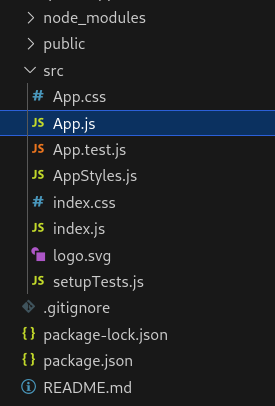React JS Toast Notification
Last Updated :
09 Oct, 2024
React Toast Notification are temporary popup messages used to provide feedback to the user’s actions. These messages involve brief information or alerts like success, warning, errors, and other updates based on the action or event occurred. Toast Notification is also called Toastify Notifications. Toast notifications in react can be easily implemented using the react -toastify module.
Prerequisites:
Approach
To create the Toast Notification in React we will be using the react-toastify npm package. We will use different variants and also the different positions for toast notifications by passing the props for the Toast Component. Toast notifications can greatly improve user interaction by providing timely feedback. The ReactJS Course includes practical tutorials on implementing notifications that keep users informed and engaged throughout their experience.
Below all the steps are described order-wise to add toast-notification and their configuration.
Steps to Create React Application and Install react-tostify
Step 1: Initialize the React Project using this command in the terminal.
npx create-react-app project
Step 2: Move to the project directory.
cd project
Step 3: Use this command to install the required module.
npm i react-toastify
Project Structure:

The updated dependencies in package.json file.
"dependencies": {
"@testing-library/jest-dom": "^5.17.0",
"@testing-library/react": "^13.4.0",
"@testing-library/user-event": "^13.5.0",
"react": "^18.2.0",
"react-dom": "^18.2.0",
"react-scripts": "5.0.1",
"react-toastify": "^9.1.3",
"web-vitals": "^2.1.4"
},Example 1: This example demonstrate the default position of toast notification i.e. Top Right.
JavaScript
// Filename - App.js
import React from "react";
// Importing toastify module
import { toast } from "react-toastify";
// Import toastify css file
import "react-toastify/dist/ReactToastify.css";
// toast-configuration method,
// it is compulsory method.
toast.configure();
// This is main function
function GeeksforGeeks() {
// function which is called when
// button is clicked
const notify = () => {
// Calling toast method by passing string
toast("Hello Geeks");
};
return (
<div className="GeeksforGeeks">
<button onClick={notify}>Click Me!</button>
</div>
);
}
export default GeeksforGeeks;
Steps to Run the Application: Open the terminal and type the following command.
npm start
Output: Open the browser and our project is shown in the URL http://localhost:3000/

Example 2: There is a total six-position where we can show our notification. These are bottom left, bottom center, bottom right, top left, top right, and top center. To change the position we need to pass, one more argument in the toasting method along with string. See below how to configure the position of notifications.
JavaScript
// Filename - App.js
import React from "react";
import { toast } from "react-toastify";
import "react-toastify/dist/ReactToastify.css";
toast.configure();
function GeeksforGeeks() {
const notify = () => {
toast("Hello Geeks 4", {
position: toast.POSITION.BOTTOM_LEFT,
});
toast("Hello Geeks 6", {
position: toast.POSITION.BOTTOM_RIGHT,
});
toast("Hello Geeks 5", {
position: toast.POSITION.BOTTOM_CENTER,
});
toast("Hello Geeks 1", {
position: toast.POSITION.TOP_LEFT,
});
toast("Hello Geeks 3", {
position: toast.POSITION.TOP_RIGHT,
});
toast("Hello Geeks 2", {
position: toast.POSITION.TOP_CENTER,
});
};
return (
<div className="GeeksforGeeks">
<button onClick={notify}>Click Me!</button>
</div>
);
}
export default GeeksforGeeks;
Steps to Run the Application: Open the terminal and type the following command.
npm start
Output: Open the browser and our project is shown in the URL http://localhost:3000/

Example 3: Upto now we have used default notification but there are four more built-in type notifications. These are a success, warning, info, and error. See below how to use them.
JavaScript
// Filename - App.js
import React from "react";
import { toast } from "react-toastify";
import "react-toastify/dist/ReactToastify.css";
toast.configure();
function GeeksforGeeks() {
const notify = () => {
// inbuilt-notification
toast.warning("Danger");
// inbuilt-notification
toast.success("successful");
// inbuilt-notification
toast.info("GeeksForGeeks");
// inbuilt-notification
toast.error("Runtime error");
// default notification
toast("Hello Geeks");
};
return (
<div className="GeeksforGeeks">
<button onClick={notify}>Click Me!</button>
</div>
);
}
export default GeeksforGeeks;
Steps to Run the Application: Open the terminal and type the following command.
npm start
Output: Open the browser and our project is shown in the URL http://localhost:3000/

Example 4: By default, notifications are shown for 5second only. To configure time, we use autoClose method, and if we set the autoclose method to false, then the user has to close that notification otherwise it will remain there only. See below how to use it.
JavaScript
// Filename - App.js
import React from "react";
import { toast } from "react-toastify";
import "react-toastify/dist/ReactToastify.css";
toast.configure();
function GeeksforGeeks() {
const notify = () => {
// Set to 10sec
toast.warning("Danger", { autoClose: 10000 });
// Set to 3sec
toast.success("successful", { autoClose: 3000 });
// User have to close it
toast.info("GeeksForGeeks", { autoClose: false });
toast.error("Runtime error", {
// Set to 15sec
position: toast.POSITION.BOTTOM_LEFT,
autoClose: 15000,
});
toast("Hello Geeks"); // Default
};
return (
<div className="GeeksforGeeks">
<button onClick={notify}>Click Me!</button>
</div>
);
}
export default GeeksforGeeks;
Steps to Run the Application: Open the terminal and type the following command.
npm start
Output: Open the browser and our project is shown in the URL http://localhost:3000/
